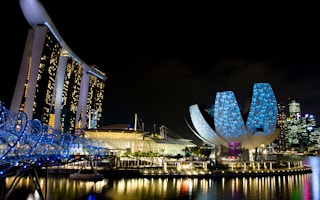A S$25 million high-tech system that controls lighting, heating and water supplies from multiple access points. Energy-efficient LED light bulbs that cost almost thrice the price of traditional bulbs – lighting up thousands of rooms, a huge mall and a convention centre with floor space equal to 17 soccer pitches. An extensive waste management strategy to help improve waste reduction and diversion.
To continue reading, subscribe to Eco‑Business.
There's something for everyone. We offer a range of subscription plans.
- Access our stories and receive our Insights Weekly newsletter with the free EB Member plan.
- Unlock unlimited access to our content and archive with EB Circle.
- Publish your content with EB Premium.
These are just some of the items that add to Marina Bay Sands’ investment tab for sustainability efforts – a considerable sum for a facility of our size and complexity.
But it has paid off and continues to pay off.
The cost of our energy-improvement plan for 2013 to 2014 has already been recouped, with the S$13 million (US$9.4 million) in energy savings we have seen to date. The results -in tangible monetary terms - are real.
The secret is this: sustainability is not just an extension of what we do. It is a philosophy instilled in our design and business operations even prior to our official opening in 2010. And behind this philosophy lies a focus on people and technology that maximises energy, carbon and water savings. We call this the Sands ECO360° Sustainability programme.
It starts with an intelligent building management system that includes more than 90,000 control points automating the lighting, cooling and water supplies for the entire complex. Our air conditioning system uses water-cooled chillers, which are nearly 80 per cent more efficient than air-cooled models, and the heat emitted from the chillers is reclaimed to provide hot water to the hotel and some of the restaurants.
Other innovative design elements include curtains programmed to close in unoccupied hotel rooms to keep them cooler, sensors that turn off the room’s air-conditioning if the balcony doors are open for an extended period, and a system in the casino that recovers cooling energy from the building exhaust to chill incoming fresh air and reduce energy use.
Looking at electricity consumption alone, our sustainability strategy saved more than 66 million kilowatt hours of power between 2012 and 2014. That is the same amount of electricity used by 14,380 four-room flats in Singapore each year.
Across the breadth of our facilities, we also focus on minimising 15 categories of waste everyday by recycling, composting uneaten food and donating surplus bread to community groups in Singapore. Every year, we recycle more than 2,200 metric tonnes of waste. We also implement a variety of water conservation measures to cut water consumption by 350 million litres compared to conventional fixtures.
Besides recycling on our own, we have also roped in our F&B tenants. One way to do so is through the use of food digesters, which break down waste into liquid and is then passed through to the sewage system. This means that food waste does not get sent to the incinerators, thereby reducing our environmental impact. We currently have five food digesters. Two of them reside at Koufu, which operates the Rasapura food court, one is in our South Podium for F&B tenants like Todai, and two are located at the Hotel. Already, we have witnessed an average of 2,500 kilograms of food waste per day, or 75,000 kg in a month, being diverted.
Besides the real savings – in energy, consumption and dollars – another bonus for us has been the many accolades for our efforts, including the notable Green Mark Platinum Award that Marina Bay Sands received from Singapore’s Building Construction Authority in January this year.
I mentioned people as a core pillar in our Sands ECO360° Sustainability programme. Having the right infrastructure is important, but behavioural change is even more important than the latest technology.
We have from day one a governance and leadership structure that addresses sustainability in the long-term, and an on-going engagement programme to garner suport for our dedicated sustainability team from all of our 9,400 employees, our partners, suppliers and guests. A strategic, multi-channel approach to engagement has been critical in transforming our culture and ingraining our employees with the concept of sustainability.
I am proud that Marina Bay Sands has brought not just a new building format of integrated resorts to Singapore, but also a new model of sustainability for a facility of this scale.
But there is much more to it than that.
We want to set the right example and share our expertise to help others embrace practices and products that are sustainable and beneficial for the environment.
This philosophy and commitment doesn’t just benefit the environment and the community - it simply makes business sense.
Kevin Teng is executive director of sustainability, Marina Bay Sands.


















